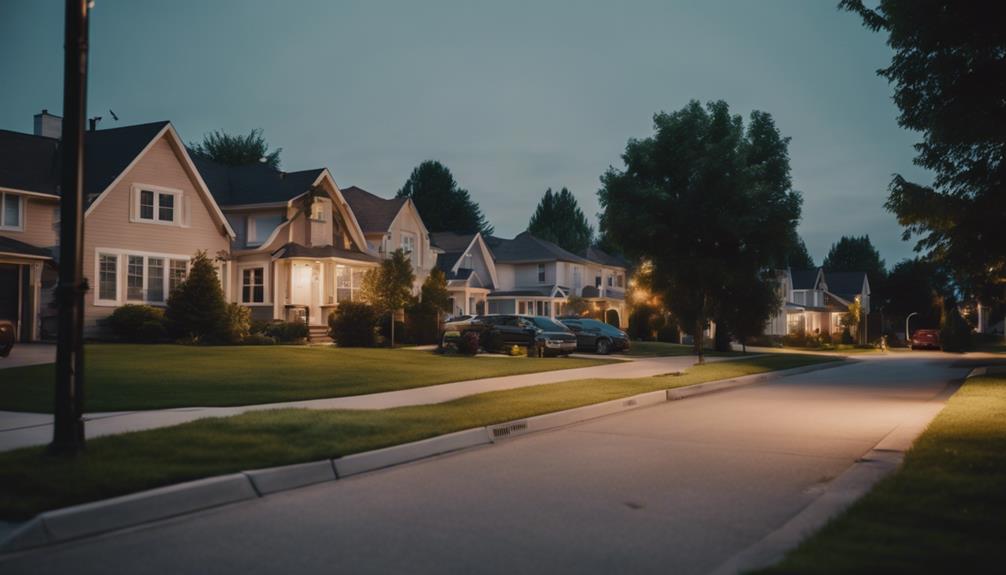The greatest DIY home security systems are both affordable and easy to put together. Choices like the Ring Alarm Kit, SimpliSafe, and Arlo Home Security offer crucial features such as motion sensors and security cameras, all without needing a professional to install them. You will love the self-monitoring choices that help you save on monthly fees, while professional monitoring provides added peace of mind. Several systems can be customized and seamlessly integrate with your smart home setup. With prices starting from less than $100 to a few hundred dollars, there’s a system for every budget out there. Keep delving into how these systems can meet your specific requirements and preferences. Dive in to learn more about these fantastic options!
Key Takeaways
- Ring Alarm Kit (2nd-gen): Affordable and user-friendly, integrates seamlessly with Amazon Alexa for convenient home security management.
- SimpliSafe Home Security: Offers extensive accessory options and flexible monitoring plans starting at just $10/month, ideal for various budgets.
- Arlo Home Security: Provides customizable sensors suitable for apartments, with no mandatory subscription, making it budget-friendly.
- Abode Smart Security Kit: Flexible compatibility with various smart home platforms allows for tailored security solutions.
Overview of DIY Home Security Systems
DIY home security systems offer a cost-effective and straightforward way for you to protect your home without the hassle of professional installation or long-term contracts. These systems provide an affordable solution tailored to your needs, featuring essential components like motion sensors, security cameras, and alarm systems.
As highlighted in recent posts, current security trends show a growing interest in DIY solutions, making them an increasingly popular choice. Whether you live in an apartment or a house, you'll find options that cater to various living situations.
One of the standout benefits of DIY home security systems is their easy-to-install nature. With minimal tools and a setup time of under an hour, you can have your system up and running quickly. This flexibility allows you to customize your monitoring experience, choosing between self-monitoring via mobile apps or opting for professional monitoring services if you prefer additional peace of mind.
Most DIY systems also integrate seamlessly with smart home devices, enhancing your overall home automation experience. You'll receive real-time alerts to stay informed about your home's security, helping you feel in control.
Plus, as your security needs evolve, many of these systems offer options for future upgrades, ensuring your home remains protected over time.
Factors to Consider

When selecting a home security system, it's vital to weigh your preferences between self-monitoring and professional monitoring services, as this can greatly impact both cost and features. If you opt for a self-monitored option, you might save on monthly fees but take on the responsibility of monitoring alerts yourself. On the other hand, professional monitoring offers peace of mind but often comes with higher costs.
Additionally, considering the best vacuum options can enhance your overall home management while guaranteeing a clean environment that complements your security measures.
Evaluate the types of DIY Home Security Systems available. Some systems provide basic monitoring with doorbell cameras, while others deliver extensive coverage with motion detectors and multiple sensors. Look for equipment bundles that include fundamental components, enabling you to expand your system as your security needs evolve.
Compatibility with existing smart home ecosystems, such as Alexa or Google Home, is vital for seamless integration. Confirm the system you choose works well with your current devices to maximize convenience.
Additionally, consider systems with modular designs that allow for future upgrades, making it easy to add new components as your security requirements change. By keeping these factors in mind, you'll find a system that best fits your lifestyle and protects your home effectively.
Our Top Picks

To help you make an informed choice, here are our top picks for DIY home security systems that balance affordability and functionality. When considering home security, it's crucial to evaluate your unique needs and risks, much like the importance of risk assessment and management techniques in survival planning.
First up is the Ring Alarm Kit (2nd-gen), priced at $250, which offers a user-friendly setup with essential components and integrates smoothly with Amazon Alexa. For those needing enhanced connectivity, consider the Ring Alarm Pro at $300, featuring an Eero Wi-Fi 6 router for future expansion.
Next, SimpliSafe Home Security starts at just $192, known for its affordability and extensive accessory options, although full functionality requires subscription-based monitoring plans beginning at around $10/month. If you live in an apartment, the Arlo Home Security system is perfect, costing $130 with customizable security sensors that detect various changes without a mandatory subscription.
Lastly, the Abode Smart Security Kit, available for $220, boasts flexible compatibility with smart home platforms and offers customization tailored to your needs. Each of these systems stands out in the domain of the Best DIY Home Security, providing essential features like home automation and video storage while ensuring affordability.
Costs and Installation

Considering costs and installation, you'll find that most DIY home security systems offer an affordable entry point with simple setups that anyone can handle. The upfront costs for these systems are generally lower, with complete setups starting at just a few hundred dollars. You can even find starter kits available for under $100, making it easy to get started.
Additionally, similar to how emotional support is important for caregivers, having a reliable security system can provide peace of mind for families concerned about safety.
Installation is designed to be user-friendly, typically taking just 1-2 hours to complete with basic tools, and you won't need professional assistance. Most DIY systems come bundled with all the necessary equipment, ensuring you have everything you need to start monitoring right away.
When it comes to ongoing costs, monitoring services vary. Subscription plans usually range from $10 to $30 per month, depending on the features and level of service you choose.
If you prefer to save money, many systems allow for self-monitoring without any additional fees. However, opting for professional monitoring may provide enhanced features like 24/7 surveillance and emergency response services, giving you peace of mind.
Expert Testing Methodology

When evaluating DIY home security systems, experts conduct hands-on tests in real home settings for at least a week.
This approach focuses on key criteria like sensor functionality and user interface ease.
Additionally, they assess compatibility with devices such as garage door openers to enhance overall security.
Hands-On Evaluation Process
The hands-on evaluation process for DIY home security systems immerses testers in real-life scenarios, guaranteeing a thorough assessment of user experience and system reliability.
During a week-long testing period, you'll gauge user interface functionality and ease of installation, essential factors that can influence your satisfaction with the system. Additionally, understanding the importance of cybersecurity measures is imperative as it can impact the effectiveness of your home security system.
Each security system undergoes rigorous testing of motion sensors and contact sensors to evaluate their responsiveness and accuracy. You'll also assess alarm effectiveness, confirming that alerts are timely and reliable. Battery backup performance is tested through simulated power outages, validating the system's reliability during emergencies.
User feedback plays a significant role in shaping the final evaluation. By gathering insights from real users, you can identify any potential issues and understand the system's real-world performance.
Additionally, a comparative analysis against competitors highlights strengths and weaknesses, providing a well-rounded perspective.
This hands-on approach not only helps you make an informed decision but also guarantees that the DIY home security system you choose meets your unique safety needs.
Real Home Testing
Real home testing immerses you in a week-long evaluation of DIY home security systems, allowing you to experience their performance and reliability firsthand. During this time, you'll assess the effectiveness of motion sensors and contact sensors under everyday conditions, ensuring they trigger alarms appropriately.
You'll also monitor alarm response times to see how quickly the system reacts to potential threats. With the integration of advanced technology, such systems can benefit from AI security measures that enhance their ability to detect and respond to threats in real-time.
Mobile apps play an essential role in home monitoring, so you'll examine their functionality and ease of use. This includes checking whether you can receive alerts in real-time and whether the app provides a user-friendly interface for managing your security settings.
Additionally, you'll simulate power outages to evaluate the battery backup capabilities of the systems, ensuring they remain operational when you need them most.
This expert testing methodology aims to mimic real-world scenarios, helping you gauge user experience and reliability accurately. Expert reviews further enhance your understanding by incorporating feedback from users who've experienced these systems in their homes.
Comparative Analysis Criteria
To effectively evaluate DIY home security systems, you'll want to focus on key criteria that reveal their performance and reliability in real-world scenarios.
Start with the effectiveness of motion sensors and contact sensors, as these are essential for detecting intrusions. Proper installation can enhance their performance, much like how heat pump failures can arise from improper setup.
Next, consider alarm sound levels; a loud alarm can deter potential threats. Battery backup capabilities are also critical, ensuring your system remains operational during power outages.
User experience is another important factor. Assess the user interface for ease of navigation and setup ease—can you manage the system without a tech degree? Evaluate how quickly systems respond to self-monitoring alerts versus professional monitoring services, as this impacts system reliability.
Don't overlook the variety of equipment options available. A broader selection allows for customization to fit your home's unique needs.
Finally, customer support is essential; responsive and knowledgeable support can make a significant difference, especially if you encounter issues.
Additional Options to Consider

When exploring home security systems, consider additional options that fit both your budget and specific needs. The Best DIY Security Systems often come with customizable options, allowing you to tailor your setup. Here's a quick comparison of some affordable choices:
| Brand | Price | Monitoring Plans |
|---|---|---|
| Cove Home Security | Under $300 | Starts at $30/month |
| ADT Self Setup | Starting at $195 | Starts at $24.99/month |
| Wyze Home Security System | Around $99 | $100/year (no cellular) |
| Frontpoint | Varies | Starts at $34.99/month |
| Ooma Smart Security Pack | Affordable | $14.99/month |
Each of these systems offers unique features, like smart home compatibility and professional monitoring. For instance, Wyze's entry-level starter kit is budget-friendly, while Cove provides high satisfaction ratings and excellent customer service. ADT combines established technology with Google Nest devices, ensuring quality. As you evaluate your options, think about what features matter most to you to create a secure home environment.
Frequently Asked Questions
What Is the Best Home Security Camera System Diy?
When you're looking for the best DIY home security camera system, consider options like Ring Alarm Kit or SimpliSafe. They offer excellent features, easy installation, and affordability, ensuring you feel secure in your home.
Is DIY Home Security Worth It?
Imagine you install a DIY system in an hour, saving money and gaining control. Yes, DIY home security's worth it; it's affordable, customizable, and lets you decide how to protect your space effectively.
Are DIY Burglar Alarms Any Good?
DIY burglar alarms can be quite effective. They're affordable, easy to install, and customizable to your needs. Many users report high reliability and quick response times, especially when paired with professional monitoring services.
Can I Install a Home Security System Myself?
Yes, you can install a home security system yourself. Most systems are designed for easy self-installation, taking just an hour or two. You'll find user-friendly instructions and all necessary components included in the equipment bundles.
What Are the Most Recommended DIY Home Security Systems?
When it comes to doityourself security systems, some of the most recommended options include Ring Alarm, SimpliSafe, and Abode. These systems provide easy installation, affordable pricing, and customizable features to fit your specific home security needs. With options for cameras, sensors, and professional monitoring, these systems offer peace of mind for homeowners.
Conclusion
In a world where safety can feel uncertain, choosing the right DIY home security system is essential.
Imagine coming home to a peaceful sanctuary, knowing your loved ones and belongings are protected.
With the right tools and a little effort, you can take control of your security.
Don't leave your safety to chance—explore your options, invest in the best, and sleep soundly tonight, because the comfort of knowing you're secure is just a decision away.









